新中国人权事业发展70年白皮书(双语全文)
新华网 2019-09-24 16:07

七、全面参与全球人权治理
VII. Full Participation in Global Governance of Human Rights
中国在大力推进自身人权事业发展的同时,始终坚持平等互信、包容互鉴、合作共赢、共同发展的理念,积极参与联合国人权事务,认真履行国际人权义务,广泛开展国际人权合作,积极为全球人权治理提供中国智慧、中国方案,以实际行动推进全球人权治理朝着更加公正合理包容的方向发展。
While promoting the development of its own human rights, China upholds the principles of equality and mutual trust, inclusiveness and mutual learning, cooperation and mutual benefits, and common development. It has been active in UN human rights undertakings, fulfills its international human rights obligations, conducts extensive international cooperation on human rights, actively offers Chinese wisdom and solutions for global governance of human rights, and advances through concrete actions the global governance of human rights in a fairer, more rational and inclusive direction.
积极参与国际人权事业。中国在1971年恢复联合国合法席位后,派团参与联合国大会和联合国经社理事会的历届会议,并积极参加有关人权议题的审议。自1979年起,中国连续3年作为观察员出席联合国人权委员会会议。1981年,中国在联合国经社理事会组织会议上当选为人权委员会成员国。自1982年起,中国正式担任人权委员会成员国并一直连选连任。2006年人权理事会成立以来,中国已四度当选理事会成员。中国推荐的多名专家担任联合国经社文权利委员会、禁止酷刑委员会、消除种族歧视委员会、消除对妇女歧视委员会、残疾人权利委员会等多个多边人权机构或专门委员会的委员。
Engaging in international human rights undertakings. Since resuming its legitimate seat in the UN in 1971, China has sent delegations to every UN General Assembly and UN Economic and Social Council (ECOSOC) conference, and actively joined in the reviews of issues concerning human rights. From 1979 to 1981 China attended the annual meetings of the United Nations Commission on Human Rights (UNCHR) as an observer state. In 1981 China was elected a UNCHR member state at the ECOSOC’s Management Segment. In 1982, China became an official member state of the UNCHR and has maintained this position ever since. Since the United Nations Human Rights Council (UNHRC) was established in 2006, China has been elected as a member state four times. A number of experts recommended by China have served on multilateral human rights organizations or special commissions such as the United Nations Committee on Economic, Social and Cultural Rights, the United Nations Committee against Torture, the United Nations Committee on the Elimination of Racial Discrimination, the United Nations Committee on the Elimination of Discrimination against Women, and the United Nations Committee on the Rights of Persons with Disabilities.
中国同联合国人权事务高级专员及其办公室保持建设性接触,先后8次接待人权高专访华,多次邀请高专办官员来华交流访问。近年来,中国与人权高专办两次签署技术合作《谅解备忘录》,内容涵盖司法改革、警察与人权、人权教育、执行人权条约等领域,并与人权高专办多次共同举办国际人权会议。自1994年至今,中国先后邀请宗教信仰自由特别报告员、任意拘留问题工作组、教育权特别报告员、酷刑问题特别报告员、粮食权特别报告员、消除对妇女歧视问题工作组、外债对人权影响问题独立专家、极端贫困与人权问题特别报告员等8个特别机制10次访华。中国认真对待人权理事会特别机制来函,在认真调查的基础上及时予以答复。
China maintains constructive contacts with the UN High Commissioner for Human Rights and the Office (OHCHR), receiving eight visits by high commissioners to China, and inviting many of the OHCHR officials to visit China. In recent years, China has signed two memorandums of understanding on technological cooperation concerning judicial reform, police and human rights, human rights education, and implementation of human rights treaties, and held together with the OHCHR many international conferences on human rights. Since 1994, China has invited ten visits by eight UN representatives and groups: the United Nations Special Rapporteur on Freedom of Religion or Belief, the United Nations Working Group on Arbitrary Detention, the United Nations Special Rapporteur on the Right to Education, the United Nations Special Rapporteur on Torture and Other Cruel, Inhuman or Degrading Treatment or Punishment, the United Nations Special Rapporteur on the Right to Food, the United Nations Working Group on the issue of discrimination against women in law and in practice, the United Nations Independent Expert on the effects of foreign debt and other related international financial obligations of states on the full enjoyment of all human rights, particularly economic, social and cultural rights, and the United Nations Special Rapporteur on Extreme Poverty and Human Rights. China handles letters from the Special Procedures of the UNHRC with due attention, carrying out any necessary investigations and giving timely replies.
切实遵守国际人权义务。中国先后批准或加入了26项国际人权文书,其中包括《经济、社会及文化权利国际公约》《消除对妇女一切形式歧视公约》《消除一切形式种族歧视国际公约》等6项联合国核心人权条约。中国严格遵守条约规定,认真履行条约义务,注重将国内的立法、修法和政策制定等与条约规定相衔接,及时提交履约报告,全面反映中国在履约过程中取得的成就及遇到的问题。中国认真参加各条约机构对中国履约情况的审议,截至2019年3月,中国已向各条约机构提交履约报告27次,总计43期,接受审议26次。中国注重与相关人权条约机构开展建设性对话,结合国情积极采纳建议。自2009年以来,中国三次接受联合国人权理事会普遍定期审议并顺利通过核可,中国对各国所提建议均给予认真、负责任的反馈。绝大多数国家肯定中国人权发展成就和中国对世界人权事业所作的贡献。
Fulfilling obligations in the international instruments on human rights. China has signed 26 international human rights instruments, including six major ones such as the International Covenant on Economic, Social and Cultural Rights, the Convention on the Elimination of All Forms of Discrimination against Women, and the International Convention on the Elimination of All Forms of Racial Discrimination. China abides by the provisions of these international conventions, fulfills all the obligations they prescribe, ensures that its policy formulation, legislation, and any amendments are consistent with these conventions, and submits periodic reports to give feedback on the progress made and any difficulties and problems encountered in implementing these international conventions. China attends all reviews from the treaty bodies on its implementation work. By March 2019, China had submitted 43 implementation reports on 27 occasions to these treaty bodies and received 26 reviews. China has conducted constructive dialogue with the relevant treaty bodies and adopted their suggestions in accordance with the actual conditions in China. China has also received three UNHRC Universal Periodic Review cycles since 2009, and the reports were adopted. China gives due attention and responsible feedback to all suggestions from other countries. Most countries have affirmed China’s achievements in this regard and its contribution to international human rights.
着力推动国际人权规则和机制发展。中国参加了《禁止酷刑和其他残忍、不人道或有辱人格的待遇或处罚公约》《儿童权利公约》《残疾人权利公约》《保护所有移徙工人及其家庭成员权利国际公约》,以及《经济、社会及文化权利国际公约》任择议定书等重要人权文件的制定工作组会议,为这些规则的起草、修改和完善作出重要贡献。中国作为主要推动者之一,参与了《发展权利宣言》的起草工作,积极推动联合国人权委员会和人权理事会就实现发展权问题进行全球磋商,致力于推动构建发展权实施机制。中国积极参与劳工保护、人道主义等领域国际规则制定。中国是《联合国气候变化框架公约》首批缔约方之一,全程参与并有效推动气候变化多边进程,为推动达成《巴黎协定》作出积极贡献。
Promoting international rules and mechanisms for protecting human rights. China has attended the meetings of the drafting groups of the Convention against Torture and Other Cruel, Inhuman or Degrading Treatment or Punishment, the Convention on the Rights of the Child, the Convention on the Rights of Persons with Disabilities, the International Convention on the Protection of the Rights of All Migrant Workers and Members of Their Families, and the Optional Protocol to the International Covenant on Economic, Social and Cultural Rights, along with other important documents on human rights protection, making a significant contribution to drafting, revising and improving these rules. As one of the major promoters, China participated in drafting the Declaration on the Right to Development, assisting the UNCHR and the UNHRC to organize global discussions on fulfilling the right to development, and is committed to building mechanisms for actualizing the right to development. China actively participates in the formulation of international rules on labor protection and humanitarianism. China was one of the first signatories to the United Nations Framework Convention on Climate Change. It actively participated in and effectively promoted the whole multilateral process of climate change issues, and made a positive contribution to the adoption of the Paris Agreement.
中国积极推动联合国人权机构改革,在设立联合国人权理事会,使国际人权机制变得更加公正客观透明等方面发挥了重要作用。中国联合发展中国家一道,推动人权理事会以公正客观、非选择性、普遍性等方式审议人权问题。中国支持联合国人权理事会设立安全饮用水、文化权、残疾人权利等专题性特别机制;倡导召开关于粮食安全、国际金融机制等的特别会议,积极推动完善国际人权机制。中国支持对人权条约机构进行必要改革,促进条约机构与缔约国在相互尊重的基础上开展对话与合作。
China promotes the reform of UN human rights bodies, and played an important role in establishing the UNHRC and making the international human rights mechanism fairer, more objective and transparent. Together with other developing countries, it assists the UNHRC to review human rights issues in a fair, objective, nonselective and general manner. China supports the UNHRC in establishing specialized mechanisms for securing safe drinking water, cultural rights, and the rights of persons with disabilities, in calling for special conferences on food security and the global financial crisis, and in improving the international mechanisms for protecting human rights. China supports the necessary reform of the human rights treaty bodies, promoting dialogue and cooperation between the treaty bodies and signatory states on the basis of mutual respect.
倡导开展国际人权交流合作。中国高度重视开展人权领域对外交流交往与合作,致力于在相互尊重、开放包容、交流互鉴基础上开展建设性人权对话和人权磋商。自20世纪90年代起,中国陆续与20多个国家建立人权对话或磋商机制,同美国、欧盟、英国、德国、瑞士、荷兰、澳大利亚、新西兰等西方国家或国际组织进行人权对话,同俄罗斯、埃及、南非、巴西、马来西亚、巴基斯坦、白俄罗斯、古巴、非盟等开展人权磋商。自1996年以来,与澳大利亚、瑞士长期开展人权技术合作。中国人权研究会等人权领域非政府组织组团赴亚洲、北美、南美、欧洲、大洋洲、非洲的数十个国家交流访问,并邀请多国人权领域的政府官员和专家学者访华,增进了理解与互信。近年来,中国多次举办国际人权研讨会,“亚欧非正式人权研讨会”“北京人权论坛”“纪念《发展权利宣言》通过30周年国际研讨会”“南南人权论坛”“中欧人权研讨会”“国际人权文博会”“中美司法与人权研讨会”“中德人权研讨会”,拓展了国际人权交流合作的朋友圈,增进了在人权问题上与各国的相互了解。
Advocating and conducting international exchanges and cooperation concerning human rights. China prioritizes communication, exchanges, and cooperation with other countries in the field of human rights, and is committed to conducting constructive dialogue and consultations on human rights on the basis of mutual respect, openness, inclusiveness, communication and mutual learning. Since the 1990s, China has established dialogue and consultation mechanisms for human rights protection with more than 20 other countries. China has organized dialogues on human rights with international organizations and Western countries, including the US, the EU, the UK, Germany, Switzerland, the Netherlands, Australia, and New Zealand, and held consultations on human rights with Russia, Egypt, South Africa, Brazil, Malaysia, Pakistan, Belarus, Cuba, and the African Union. Since 1996, China has conducted technical cooperation on human rights with Australia and Switzerland. The China Society for Human Rights Studies (CSHRS) and other human rights NGOs in China have organized teams to visit dozens of countries in Asia, North America, South America, Europe, Oceania and Africa, and invited government officials, experts and academics on human rights from various countries to visit China, which has increased mutual understanding and trust. In recent years, China has hosted several international seminars on human rights, including the Informal Asia-Europe Meeting (ASEM) Seminar on Human Rights, the Beijing Forum on Human Rights, the International Seminar on the 30th Anniversary of the Adoption of the UN Declaration on the Right to Development, the South-South Human Rights Forum, the China-Europe Seminar on Human Rights, the International Seminar on Human Rights and Museology, the Sino-American Dialogue on the Rule of Law and Human Rights, and the China-Germany Seminar on Human Rights, which increased China’s circle of friends in exchange and cooperation on human rights, and enlarged mutual understanding with other countries in this regard.
积极引导国际人权治理变革。中国不仅注重自身人权事业的提升,也始终重视引导全球人权治理体系变革。1954年,中国与印度、缅甸提出互相尊重主权和领土完整、互不侵犯、互不干涉内政、平等互利、和平共处五项原则,体现了对国家独立的认可,尊重了相关国家和人民的自主权。1955年,在中国推动下,万隆会议通过的《亚非会议最后公报》将“尊重基本人权”写入和平共处十项原则的第一条。万隆会议通过的十项原则是对和平共处五项原则的引申和发展。20世纪60年代兴起的不结盟运动把五项原则作为指导原则。1970年和1974年联合国大会通过的有关宣言接受了和平共处五项原则。60多年来,和平共处五项原则逐渐走出亚洲走向世界,为推动建立更加公正合理的国际政治经济秩序、建立新型国际关系作出了历史性贡献,也为国际人权治理提供了重要遵循。
Actively leading the reform of international human rights governance. In addition to making progress in its own human rights protection, China also attaches importance to leading the reform of the international human rights governance system. In 1954, together with India and Burma, China proposed the Five Principles of Peaceful Coexistence: mutual respect for each other’s territorial integrity and sovereignty, non-aggression, non-interference in each other’s internal affairs, equality and cooperation for mutual benefit, and peaceful coexistence, which embodies the acknowledgement and appreciation of national independence, and respect for the decision-making power of independent countries and their peoples. In 1955, encouraged by China, the final Communiqué of the Bandung Conference incorporated “respect for fundamental human rights” as the first point into the 10-point declaration on promotion of world peace and cooperation. The 10-point declaration passed at the Bandung Conference is a derivation and development of the Five Principles of Peaceful Coexistence. The Non-Aligned Movement that rose in the 1960s set the Five Principles of Peaceful Coexistence as its guideline. The declarations adopted at the 1970 and 1974 UN general assemblies accepted the Five Principles of Peaceful Coexistence. Over the six decades that have since passed, the influence of the Five Principles of Peaceful Coexistence has expanded from Asia to the whole world. It has made a historic contribution to building a fairer and more reasonable international political and economic order and establishing a new type of international relations, and serves as a guide for the international governance of human rights.
多年来,中国不断总结提炼自身人权保障实践经验,向国际人权事业贡献中国智慧和方案。1993年,中国推动亚洲国家通过《曼谷宣言》。中国作为第二届世界人权大会的副主席国,参加《维也纳宣言和行动纲领》的起草工作。中国提出的“发展对享有所有人权的贡献”的决议在联合国人权理事会通过,首次将“发展促进人权”引入国际人权体系。近年来,中国提出的推动共同构建人类命运共同体理念在国际社会引起热烈反响,多次被写入联合国人权理事会、联合国安理会等机构的决议,为推动国际人权治理向着更加公正合理包容的方向发展发挥了重要作用。
Over the years, China has kept summing up its own experience in human rights protection, and provided the international community with Chinese wisdom and solutions. In 1993, China pushed for the adoption of the Bangkok Declaration among Asian countries. Holding the vice presidency of the Second World Conference on Human Rights, China participated in drafting the Vienna Declaration and Program of Action. The UNHRC passed the resolution “The Contribution of Development to the Enjoyment of All Human Rights” submitted by China, which introduced the concept of “promoting human rights through development” into international human rights for the first time. The idea of building a global community of shared future proposed by China has elicited a positive international response. The concept has been written into many resolutions of the UNHRC, the United Nations Security Council, and some other UN organizations. It plays an important role in advancing the international governance of human rights in a fairer, more reasonable and inclusive direction.
八、推动世界人权事业发展
VIII. Advancing the International Cause of Human Rights
新中国成立后,中国在不断推进自身人权事业的同时,积极支持广大发展中国家摆脱殖民统治、实现民族独立、消除种族隔离的正义事业,努力提升发展中国家的发展能力、提供发展援助、进行人道主义援助,在维护世界和平与发展、推动国际人权事业发展进步等方面作出了重要贡献。
Since the founding of the PRC, in addition to advancing the human rights of its people, China has earnestly supported the just cause of other developing countries to break free from colonial rule, achieve national independence, and eradicate racial segregation. It has helped them to build up their capacity for development, and provided them with development assistance and humanitarian relief. These are great contribution to safeguarding world peace and development and furthering the international cause of human rights.
助力发展中国家经济社会发展。中国注重推动广大发展中国家人民生存权、发展权的实现,长期在基础设施及教育、卫生、农业等领域向亚洲、非洲、拉丁美洲等的发展中国家和地区提供支援和帮助。中国在提供国际援助时,坚持不附带任何政治条件、不干涉受援国内政,始终做到相互尊重、平等对待、重信守诺。1963年,中国首次派出援外医疗队,截至2019年8月,已累计派遣医疗队员2.6万人次,诊治患者2.8亿人次。1964年,中国政府宣布以平等互利、不附带条件为核心的对外经济技术援助八项原则,确立了中国开展对外援助的基本方针,在工业、农业、教育、医疗、公共设施等各部门、各领域广泛开展对外援助。中国同多个发展中国家建立了经济技术合作关系,援建了坦赞铁路、毛里塔尼亚友谊港、中非友谊医院、老挝琅勃拉邦医院、斯里兰卡纪念班达拉奈克国际会议大厦、埃及开罗国际会议中心、肯尼亚国际体育中心、坦桑尼亚国家体育场等一批重大基础设施。近年来,中国国家主席习近平等党和国家领导人多次在国际场合宣布系列重大对外援助倡议和举措。中国多次主动免除与中国有外交关系的最不发达国家、重债穷国、内陆发展中国家、小岛屿发展中国家的债务。
Supporting economic and social development in other developing countries. To help the peoples of developing countries to realize their rights to subsistence and development, China has long provided assistance to other developing countries and regions in Asia, Africa, and Latin America in such fields as infrastructure, education, healthcare and agriculture. When providing international aid, China never imposes political conditions, nor does it interfere in the internal affairs of recipient countries. It always stands by the rules of mutual respect, each party treating the other as an equal, and keeping its commitments.
In 1963, China dispatched its first international medical aid team. By August 2019, it had dispatched 26,000 medical workers on aid missions abroad, who have treated 280 million patients. In 1964, the Chinese government announced the eight principles for foreign economic and technical aid, setting its basic policy for international assistance: these focus on equality and mutual benefit, and no conditions are attached. It has since provided international assistance that covers all sectors of economy and all fields of society, including industry, agriculture, education, medical care, and infrastructure. China has established partnerships for economic and technological cooperation with many developing peers, and helped build a significant number of infrastructure projects in these countries. Among them are the Tanzania-Zambia Railway, the Friendship Port in Mauritania, the Friendship Hospital in Central African Republic, the Luang Prabang Hospital in Laos, the Bandaranaike Memorial International Convention Hall in Sri Lanka, the Cairo International Conference Center in Egypt, the Moi International Sports Center in Kenya, and the National Stadium of Tanzania.
In recent years, President Xi and other CPC and government leaders have announced a raft of major foreign aid initiatives and measures at international events. In addition, they have offered multiple rounds of debt exemption for countries that have diplomatic relations with China – the least developed countries, heavily indebted poor countries, landlocked developing countries, and small island developing countries.
着力提升其他发展中国家发展能力。20世纪50年代开始资助其他发展中国家学生来华学习,帮助亚洲和非洲国家建设普通和技术院校,60年代开始向发展中国家派遣援外教师,70年代至80年代以接收留学生的方式专门为受援国培养中高级技术和管理人才。近年来,中国先后设立南南合作援助基金、南南合作与发展学院、金砖国家经济技术合作交流计划等,通过举办培训、外派管理人员和技术专家、提供奖学金等方式,帮助其他发展中国家培养人才。为支持全球妇女事业发展,2015年,习近平主席在全球妇女峰会上宣布,邀请3万名发展中国家妇女来华参加培训,并在当地为发展中国家培训10万名女性技术人员。中国发起成立亚洲基础设施投资银行、丝路基金,与其他金砖国家共同发起成立新开发银行等国际金融机构,充分借助上海合作组织、金砖国家等机制的带动作用,提出共商共建共享“一带一路”倡议,与沿线国家或地区达成合作项目,主动分享发展机遇和经验,为增进各国民生福祉作出新贡献。
Helping other developing countries to build up their capacity for development. In the 1950s, China began to provide funds to people of other developing countries to study in China, and to help African and other Asian countries to build regular and technical schools. In the early 1960s, it began to dispatch teachers to other developing countries. In the 1970s and 1980s, it began to cultivate senior and mid-level technicians and managers for its aid targets by admitting their students. In recent years, China has set up the Assistance Fund for South-South Cooperation and the Institute of South-South Cooperation and Development, and launched an economic and technical cooperation plan for BRICS countries. By providing training courses, dispatching managerial and technical professionals, and offering scholarships, it helps other developing countries to cultivate talent. In support of women’s development worldwide, President Xi announced at the 2015 Global Summit of Women that China would invite 30,000 women from other developing countries to attend training in China, and would train another 100,000 female technicians in their countries. China initiated the Asian Infrastructure Investment Bank and the Silk Road Fund. It also worked with other BRICS countries and established the New Development Bank and some other international financial institutions. While fully relying on mechanisms such as the Shanghai Cooperation Organization (SCO) and BRICS, it has proposed the Belt and Road Initiative featured with extensive consultation, joint contribution and shared benefits. Through cooperation projects with countries or regions along the routes of the Belt and Road, China shares its development opportunities and experience and thereby contributes more to improving the wellbeing of their peoples.
积极开展人道主义援助。中国的人道主义援助对象和规模不断扩大,同时,中国始终恪守反对人道主义干涉的原则,从不干涉被援助国内政,充分尊重当地人文环境和风俗习惯。中国积极参与联合国机构主导的国际人道主义活动,1979年加入联合国儿童基金会、世界粮食计划署,恢复了在联合国难民署执委会的活动,并多次向其捐款捐物。2004年中国建立人道主义紧急救灾援助应急机制,向朝鲜、孟加拉国等国提供粮食等人道主义物资援助;向东南亚国家提供防治禽流感技术援助;就几内亚比绍蝗灾和霍乱,墨西哥甲型H1N1流感,非洲埃博拉、黄热病、鼠疫等传染病疫情,尼泊尔、日本、伊朗、海地、智利、厄瓜多尔、墨西哥地震,马达加斯加、美国卡特里娜、加勒比有关国家飓风,菲律宾超强台风海燕,印度洋海啸、印度尼西亚巽他海啸,马来西亚、缅甸、巴基斯坦洪灾,老挝水电站溃坝,智利山火等提供物资、现汇或人员等人道主义援助。在2011年利比亚撤侨行动中,中国协助亚洲、欧洲12个国家撤离约2100名外国公民。在2015年也门撤侨行动中,中国协助亚洲、非洲、欧洲、美洲15个国家撤离279名外国公民。
Providing humanitarian relief. Over the past years, China’s humanitarian relief has increased, and the number of recipients has grown steadily. Throughout this process, China adheres to the principle of opposition to any interference under the pretext of humanitarianism. It never meddles in the internal affairs of recipient countries, and fully respects their culture and customs. China takes an active part in international humanitarian relief initiatives launched by UN organizations. In 1979, it joined the United Nations International Children’s Emergency Fund and World Food Program, and resumed its activities in the Executive Committee of the United Nations High Commissioner for Refugees (UNHCR). It has since made many donations to the UNHCR.
In 2004, China launched an emergency mechanism for urgent international humanitarian relief, under which it has provided relief to many countries. This relief includes food and other material assistance to the Democratic People’s Republic of Korea and Bangladesh, and technical aid to Southeast Asian countries to combat avian influenza. It also covers funding, personnel, and in-kind support to fight diseases and natural disasters:
• in Guinea-Bissau against locust plague and cholera;
• in Mexico against A/H1N1 flu;
• in Africa against Ebola, yellow fever, plague and other infectious diseases;
• in Nepal, Japan, Iran, Haiti, Chile, Ecuador and Mexico against earthquakes;
• in Madagascar and the Caribbean countries against hurricanes;
• in the US against Hurricane Katrina;
• in the Philippines against Super Typhoon Haiyan (Yolanda);
• in the Indian Ocean countries against tsunami;
• in Indonesia against 2018 Sunda Strait Tsunami;
• in Malaysia, Myanmar and Pakistan against floods;
• in Laos against a dam collapse in 2018;
• in Chile against mountain fires.
China assisted 12 Asian and European countries to extract about 2,100 of their citizens in its evacuation operation from Libya in 2011, and again helped 15 Asian, African, European, and American countries to extract 279 of their citizens in the evacuation operation from Yemen in 2015.
努力维护世界和平与安全。作为和平共处五项原则的积极倡导者和坚定实践者,中国不仅自身积极奉行和平外交思想、注重与各国和平共处,而且积极倡导共同、综合、合作、可持续的安全观,致力于推动南南合作和南北对话,努力缩小南北差距。中国在巴勒斯坦问题、伊朗核问题、朝鲜半岛问题、叙利亚问题等重大国际、地区热点问题上积极建言献策、身体力行,呼吁各方冷静克制,以政治外交等手段和平解决争端。中国积极参与国际执法安全合作,在联合国、国际刑警组织、上海合作组织等国际和地区组织框架下加强合作,打击一切恐怖主义、分裂主义、极端主义犯罪和毒品犯罪。中国自1990年起参加联合国维和行动,是联合国安理会常任理事国中派出维和人员最多的国家,也是联合国维和行动第二大出资国。截至2018年5月,中国已累计向苏丹、黎巴嫩、柬埔寨、利比亚等国家和地区派出维和军事人员3.7万余人次,先后派出维和警察2700余人次,参加了约30项联合国维和行动。
Safeguarding world peace and security. An active advocate and a faithful practitioner of the Five Principles of Peaceful Coexistence, China pursues a foreign policy of peace and peaceful coexistence with all countries, and is also a firm advocate of common, comprehensive, cooperative and sustainable security. It is committed to advancing South-South cooperation and North-South dialogue, and to narrowing the South-North gap. China has put forward proposals and initiatives and made concrete efforts to address many major international and regional flashpoints, such as the Palestinian issue, the Iranian nuclear issue, the Korean Peninsula issue, and the Syrian issue. It calls for all parties concerned to stay calm, exercise restraint, and solve disputes by political and diplomatic means. China is also active in international cooperation on law enforcement and security. It has intensified cooperation under the framework of international and regional organizations, including the UN, the International Criminal Police Organization, and SCO, to combat terrorism, separatism, extremism, and drug-related crimes. China began to participate in UN peacekeeping operations in 1990. It now ranks first among the permanent members of the UN Security Council in terms of the number of peacekeepers dispatched, and is the second largest donor country to UN peacekeeping operations. By May 2018, China had sent more than 37,000 military and more than 2,700 police personnel to participate in about 30 UN peacekeeping missions in Sudan, Lebanon, Cambodia, Libya, and other countries and regions.
结束语
Conclusion
新中国的70年,是为中国人民谋幸福的70年,也是为世界人民谋发展的70年。新中国人权事业发展取得的巨大成就,有目共睹,永载史册。这是中国道路的成功,是中国人民的胜利。在庆祝中华人民共和国成立70周年之际,中国人民愿与世界各国人民一道分享成功与胜利的喜悦。
In the 70 years since its founding, the PRC has been working for the wellbeing of the people, and also for global development. Its unprecedented achievements in human rights protection have been witnessed by all and will go down in history. They represent the success of the Chinese path, a victory for the people of China. As we are celebrating the 70th anniversary of the founding of the PRC, the Chinese people are happy to share this success and victory with the peoples of the rest of the world.
当前,在以习近平同志为核心的党中央坚强领导下,中国人民正在为实现“两个一百年”奋斗目标和中华民族伟大复兴的中国梦而努力。在未来的岁月里,随着全面建成小康社会的实现,随着国家基本实现现代化,随着建成社会主义现代化强国,中国人民必将享有更加广泛、更加充分的权利,中国人民必将在更高水平上实现全面发展。
The Chinese people are striving to achieve the Two Centenary Goals and the Chinese Dream of national rejuvenation under the leadership of the CPC Central Committee with Xi Jinping as the core. In future, as these goals are attained and China becomes a great modern socialist country, the Chinese people will certainly enjoy to the full more extensive rights and realize well-rounded development at higher levels.
在新的历史时代,中国将秉持文明多样和文明交流互鉴精神,与国际社会一道,推动各国共同发展、共同繁荣,促进世界人权事业发展,共同构建人类命运共同体。
In this new era, China will continue to uphold cultural diversity, communicate with and learn from other civilizations, and work with the international community for common development and prosperity, for progress in human rights worldwide, and for building a global community of shared future.









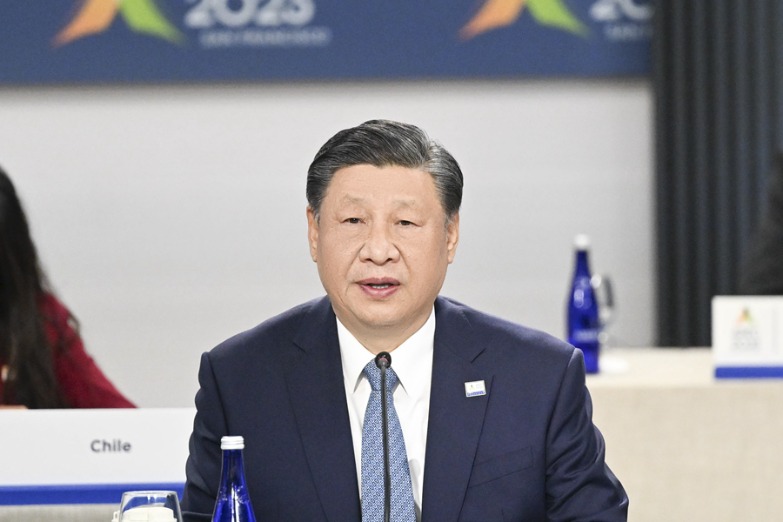
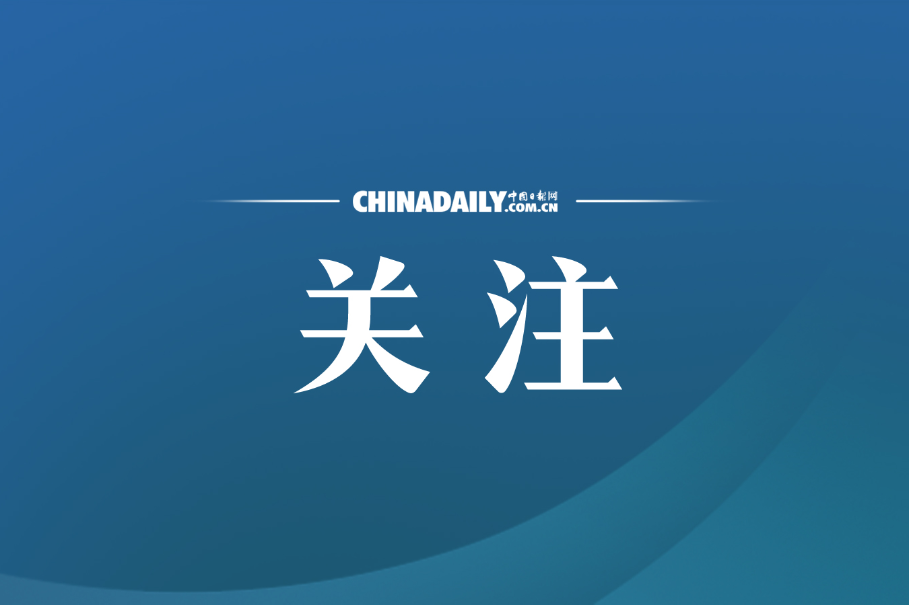
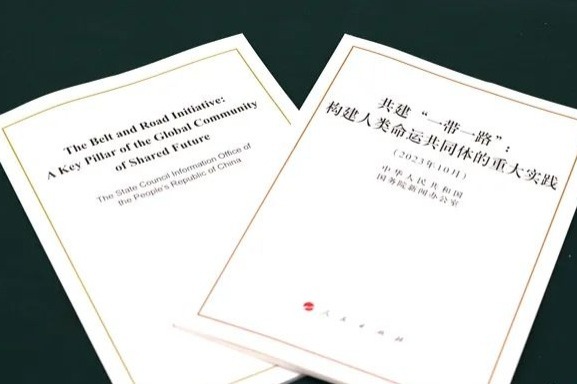
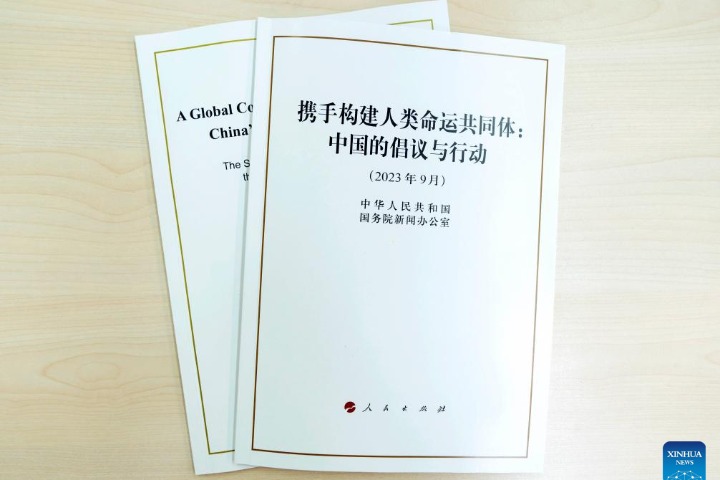
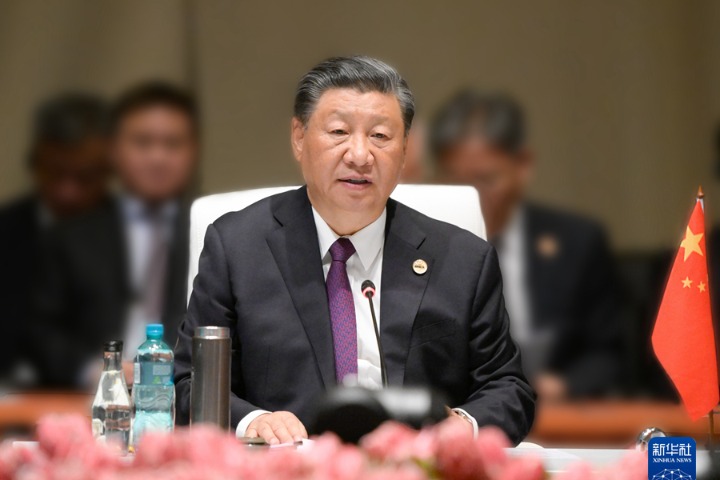



 英语点津微信
英语点津微信 双语小程序
双语小程序